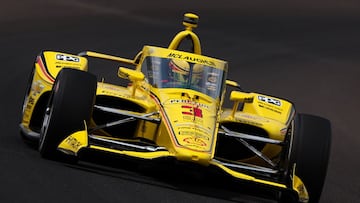The need for speed: Indy 500 vs NASCAR vs Formula 1 | Find out which car is the fastest
It’s a question racing fans often ask and with the growing popularity of Formula 1 in the US along with the well known NASCAR and Indy races, we’re here to help.

Car racing in all forms is huge in the United States. NASCAR and Indy are by far the greatest motorsports spectacles in the country. Formula 1 on the other hand, is a slightly different ball, I mean ‘wheel’ game, though it must be said that with the addition of both the Miami and Las Vegas Grand Prix the sport has been growing in popularity.
🌎🏁 14 countries will be represented in this year's #Indy500. pic.twitter.com/wiMW4CxGhA
— INDYCAR on FOX (@IndyCarOnFOX) May 22, 2025
It’s also worth noting that a significant amount of the interest has been pushed by Netflix’s immensely popular series, Formula 1: Drive to Survive, which gives a behind-the-scenes look at the world’s most prestigious motorsport. Yet, between them, which car is the fastest and why?
See also: What happened to Scott McLaughlin at the Indy 500? Team Penske driver out on warm up
NASCAR car weight
NASCAR races have the slowest cars among these three series simply because of the weight of the vehicles, which stands at around 3,000 lbs. These stock cars featuring V-8 engines can reach top speeds of up to 200 mph, and can go from 0 to 60 mph in 3.4 seconds.
A full-throttle weekend of remembrance.
— NASCAR (@NASCAR) May 20, 2025
This is the #CocaCola600. pic.twitter.com/w0QBV2hrIM
IndyCar speed
Next up we’ve got the IndyCar series, which as you know brings us the famed Indy 500. An open-wheeled car in the same way as its Formula 1 counterpart, these speedy machines are understandably much lighter than their NASCAR neighbors. With an average weight that’s less than 1,400 lbs. - less than half of NASCAR’s stock cars - it’s no wonder that they are quicker. To date, the fastest recorded speed in an IndyCar competition stands at 236 mph. It lags a little bit in acceleration, needing up to three seconds to reach speeds of 90 kph (56.25 mph) on a straight track.
This Sunday, 1 in every 1,100 people in the Unites States will be here:#Indy500 pic.twitter.com/XWt0u1MHwg
— Jake Query (@jakequery) May 19, 2025
Formula 1 acceleration
Related stories
Formula 1 cars are slightly heavier than IndyCar ones, although they look quite similar. Weighing in at roughly 1,600 lbs., their top speed is slightly less than that of the IndyCar, with the current the record being 231.4 mph set by Valtteri Bottas in 2016 at the Mexican Grand Prix.
Valtteri Bottas currently holds the record for the highest nspeed in a Formula 1 race, hitting 231.4mph in the 2016 Mexican Grand Prix, But what may seem like a fluke requires intensive testing before racers hit the track.
— Electronic Specifier (@electronicspec) January 17, 2023
👉 https://t.co/mp7eMOVQUc pic.twitter.com/U440R5kyoM
Yet, there is a fascinating quirk to note about the IndyCar vs the Formula 1. Though the IndyCar is faster in a straight line, the F1 car is faster over an entire lap due to its exceptional downforce and cornering speeds. To put this in perspective, back in 2019 at the Circuit of America, both cars raced. The IndyCar pole time was 1m46.018s with an average speed of 186.349km/h, while the F1’s pole time set by Valtteri Bottas in 2019 was 1m32.029s, averaging 206.374km/h. Now you know.


Complete your personal details to comment